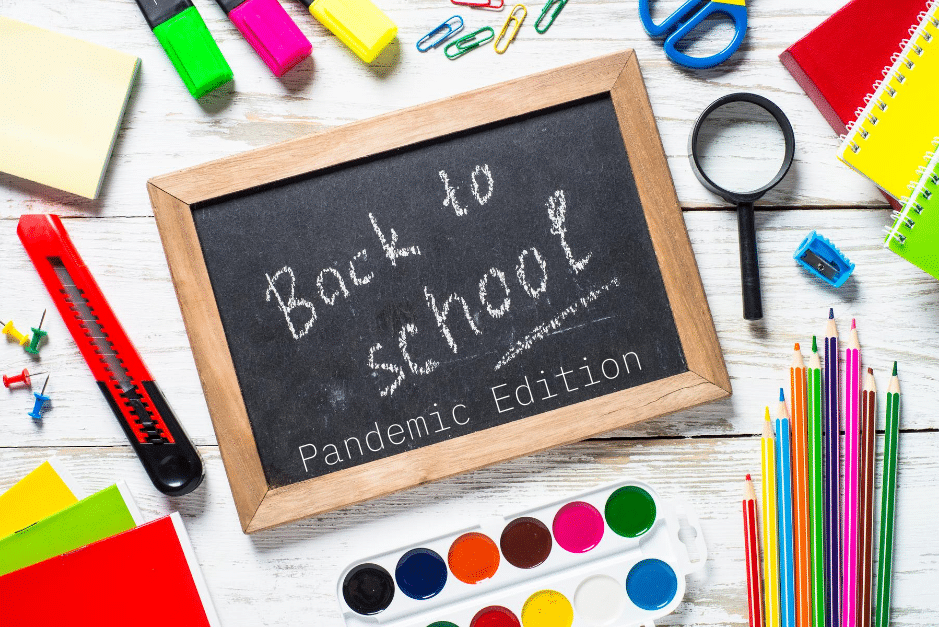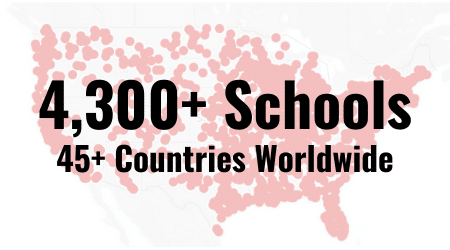Back-to-School Prep: Pandemic Edition
Every year at this time, we usually share our evergreen article, 21 Days to Back-to-School Bliss. I wrote it before I had children of my own, but have since referenced it for 15 back-to-school seasons as a mom.
Yet not one of those seasons has ever compared to this year! Nor does any one of us have any grid for what we are stepping into. In my state, we are 4-5 weeks away from back-to-school. A lot can change in that time and nobody knows what the “first day of school” is going to look like.
So, this year, I’m embracing a different mindset and series of preparations…
The Paradox of Structured Flexibility
We all know that children/students/humans do best with “structure.” We also know the value of flexibility (even prior to the pandemic). “Structured flexibility” sounds like opposing forces, but this is a paradox we can adopt for the school year.
I foresee this rolling out for our family with the following:
- Clear priorities
- Routine(ish) schedule
- Anchor points
- Intentional inputs
- Having fun!
Clear Priorities
Being very clear on how we will “rank” decisions and “to dos” is the most important thing we can do to navigate this season of uncertainty. For our family, we’ve established the following priorities:
- Our health is #1, especially our emotional well-being. We are going to do what we can reasonably do to manage life. We are not going to hold ourselves to unattainable expectations. We are going to support one another and make an extra effort to be forgiving of ourselves and one another.
We have created a social-emotional kit, including a Feelings Wheel and Coping Cards for students and adults of all ages, at this page. (See the teal box on the right side of the screen.) - Our community is #2. We are all facing new challenges with childcare, eldercare, logistics of cramming both school and work into our homes that were not intended to house either, lost jobs, “new normals,” and countless other challenges.
To make matters worse, there is a very active movement right now making it seem “socially acceptable” to judge and chastise others. If we are not consciously and actively committed to SUPPORTing our neighbors, we will easily fall into the “mainstream” flow of judging and condemning. These are simply low-level, knee-jerk reactions to fear, but they are very damaging to the targeted individuals and ultimately weaken our communities. - Our livelihood is critical. Our children’s academic growth is of extreme importance to us, but we are kidding ourselves if we think that we can give full and proper attention to “home school” and our full-time jobs at the same time. Both will have to make some sacrifices, but we cannot diminish the importance of financial sustainability. We could argue that, in an ideal world, this should not matter. But we’re not in an ideal world.
Meanwhile, present circumstances are challenging all of us, across all generations, to pay closer attention to what really matters in every aspect of our lives, including our work, family, intra- & inter-personal lives. Within each of the five priorities I’m outlining here, there are many nuanced micro-priorities to work through. This will take time. It will be messy. It will require that we are patient with the process and forgiving of imperfection. - Growth over “perfection.” In the best of circumstances, striving for “perfection” is damaging. In the midst of a global pandemic, it simply expedites the downward spiral. We must change our metric of success from “tangible outcomes” (sorry, “SMART goals”) to “indicators of growth.”
- Academics will fall into place. Please, please, please do not misunderstand what I mean… I know the full heart and compassion teachers put into planning lessons. I know how deeply teachers are committed to student learning. Obviously, curriculum-creation is our bread-and-butter, so I am not discrediting these passions or efforts. I am simply saying that if the previous priorities are not in place, academics will not fall into place, either.
For my family, placing “academics” at #5 is about giving ourselves permission to pull back on academic pressures. “Academics as usual” will be close to impossible in the next school year and academic success at the expense of our mental well-being is always counterproductive.
For teachers, placing “academics” at #5 is a reminder that the most important thing you will be delivering to your students every day is reassurance. Whether you are all showing up in person, on zoom, through an LMS, or “all of the above,” the fact that you are SHOWING UP is the single most important thing! “Showing up” reinforces the notion of community and that “we are all in this TOGETHER.” Any learning that happens over and above this will be cherries on top! (There will be a lot of cherries, but only if we can embrace the value of the intangible stuff, first.)
FYI: To help ease the transition to virtual or hybrid learning, we created several FREE resources for teachers about preparing for virtual learning: see here.
Routine(ish) Schedule
Whether we are going to school or doing school at home, we will follow the same general schedule as much as reasonably possible. This will allow us to float across contingencies with minimal friction. Admittedly, I am a natural night-owl and don’t do so well at following a schedule without help from outside structure. However, during the spring shut-down, I would say we were “80% successful” at keeping school hours, so this will be our continued goal.
Anchor Points
“Anchor points” are the “anchoring times” throughout our day and week to check-in and evaluate tasks and priorities. Anchor points were very useful before the pandemic, but they are a necessity now!
With so many disruptions happening in our lives, we must be very intentional about evaluating/reevaluating what is happening and how we are responding to it. In our household, we have adopted two primary anchor points:
- Beginning of the week: Usually on Sunday evening, we gather the family and review our calendar for the forthcoming week. (We also take a peek ahead to the following week to see if there’s anything we should be preparing for now.) During this time, we coordinate our master plans and logistics. (For students who live in two homes, we’ve always recommended a brief weekly meeting with both parents/guardians to provide some clarity about the forthcoming week.)
There are endless benefits to this “top-of-the-week planning meeting”:
-
- It allows everyone to get on the same page.
- It reduces “last-minute syndrome.”
- It brings logistical challenges to light before they become urgent and “interfering” problems.
During a pandemic, there are some added benefits:
-
- It prompts us to evaluate how things have changed/will change in the near future; contingencies become less chaotic.
- It gives everyone an opportunity to think about and identify what is NOT working.
- It allows us to work together to determine new/better solutions.
- It creates a structure of stability, while we all work together to flexibly calibrate for new circumstances.
- Daily: We programmed our “smart speakers” (i.e. Alexa, Google Assistant) to play a specific song* every night at 7:00 PM. If we’ve eaten dinner together, this time falls at the end of dinner time. If we have not eaten dinner together, the song prompts all of us to stop what we are doing and gather in the kitchen/living room to check in with one another.
Three great questions to ask during this time are:
-
- What have you done today?
- What do you plan to do tomorrow?
- What is getting in your way? (These questions are courtesy of agile project-management; more to come on this topic in future months.)
This exchange is five minutes, ten tops! Then, we divvy up chores to tidy up the house. All together, it’s less than 20 minutes. (Our children are 11 and 16, so they are very capable of helping with dishes, trash, vacuuming, etc. This plan may not work as “ideally” for children under six. Use your discretion.)
*The song we chose is a nod to a special memory we all share from Disney World’s Snow White & the Seven Dwarfs Mine Ride; every night at 7pm, we are interrupted with the “dink dink dink” of Heigh Ho. (We have until the end of the song to make it to the kitchen.) We chose this song to emphasize a light-hearted approach to this daily check-in.
If both weekly and daily check-ins are too overwhelming, start with “weekly;” a weekly meeting prompts a wider perspective and is much more powerful for maintaining “structured flexibility.”
Intentional Inputs
Both mainstream and social media are sources of never-ending fear and divisiveness. In the middle of June, our beloved school community fractured in half and turned against one another… it was an ugly response to current events, but it made me realize that I needed a break. I’ve always had boundaries on my use and consumption of social media (and I NEVER watch the “news”), but after witnessing my own community turn on one another, I clamped down even more on my personal boundaries.
Now, I’m consciously filling my “down time” during the day (morning prep, food prep, laundry, etc.) with audible books and podcasts chosen for their positivity and inspiration. (Personal note: I’m finding the words and messages of Richard Rohr to be extraordinarily healing for present times; his message elevates past the dualistic thinking and divisiveness of politics to one of wholeness and unity across humanity. He’s grounded in his Christian upbringing, but he is inclusive of all of humanity, regardless of faith or demographic.)
Having Fun!
We have to make time for fun! If we lose sight of playfulness and joy, we will lose sight of what this whole human journey is about. We must find ways to incorporate fun with things like family game/movie nights, getting outside, taking up new hobbies/interests… even if responsibilities are compounding, we MUST carve out some time for FUN!
Life is good. Even in the midst of a chaotic pandemic, we can all work together to find the joy.
To our students’ success,
Susan Kruger
Co-Author of SOAR Study Skills + SOAR Social-Emotional Learning Skills
Study Skills for Virtual Learning
The following is a brief directory of our resources for study skills:
- Free tools to help teachers PREPARE for virtual/hybid learning, here.
- Details about the new “study skills for virtual learning” modules in our student curriculum, here.
- Purchasing information for schools, here.
- Purchasing information for parents, here.
Social-Emotional Skills
The following is a brief directory of our resources for social-emotional skills:
- Details about what SOAR SEL is, here.
- A breakdown of what is covered in the SOAR SEL curriculum, here.
- Purchasing information for schools, here.
Six Steps to
Conquer the Chaos
Get Our Free Guide & Information on...

"*" indicates required fields
SOAR® in the News
The SOAR® Curriculum
The most critical learning, organizing, and communication skills needed for school. Learn more here.
Who’s Using SOAR®?
SOAR® Guarantee
Click here to learn more.





